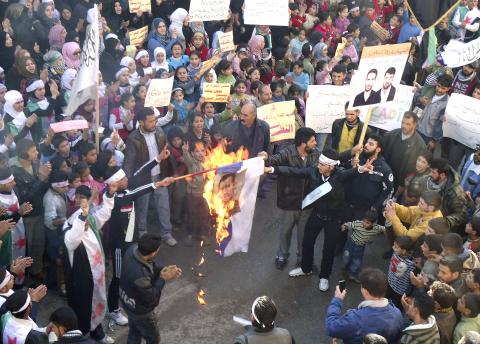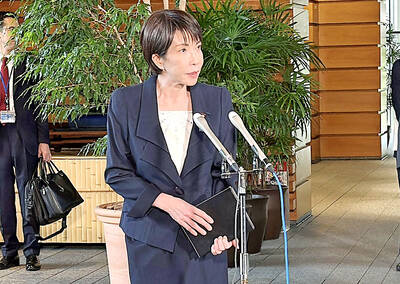Russia’s offer of a new UN Security Council resolution on the violence in Syria is a pragmatic step by a country increasingly isolated in its support for a widely discredited leader.
The shift allows Russia to look less recalcitrant without giving ground on its opposition to sanctions or foreign military interference, which it has vociferously opposed since the NATO operation in Libya.
With the death toll mounting in bloodshed the world blames mostly on Syrian President Bashar al-Assad, the Kremlin is under increasing pressure to abandon a government that has given Moscow one of its firmest footholds in the Middle East.

Photo: Reuters/Handout
It took a small step in that direction on Thursday, circulating a draft resolution that refers to “disproportionate use of force” by the Syrian authorities and urges them to stop “the suppression of those exercising their rights.”
In the short term, analysts said, Russia sees that it must distance itself from Assad in the eyes of the world.
“Russia is changing its position because to completely defend the Syrian regime is impossible given that everyone is against it, including practically all the Arab nations,” said Fyodor Lukyanov, editor of the journal Russia in Global Affairs.
“The point is to show that Russia favors a settlement, but is not a protector of Assad’s regime,” he said.
Russia has hosted Syrian opposition groups in recent months, but has rebuffed their pleas to press Assad to step down. Its diplomats have frequently said his opponents share much of the blame for the bloodshed.
In October, Russia and China used their veto power as permanent UN Security Council members to block passage of a Western-drafted resolution that would have condemned Syria’s government, calling it one-sided.
Western nations said Russia’s own draft made an unacceptable attempt to assign equal blame to the government and opponents.
The proximate cause for presenting a new one may have been a report this week in which UN human rights chief Navi Pillay said the death toll in nine months of protest exceeded 5,000 and that Syria’s actions could constitute crimes against humanity.
“We think that it’s because Russia has felt the pressure of the international community, especially after the shocking report of Mrs Pillay,” French Ambassador to the UN Gerard Araud said.
Longer term, Russia is hedging its bets on a game whose outcome is unclear.
Syria has been a major client for Russian arms sales and hosts a Russian naval maintenance facility on its Mediterranean coast, a rare outpost abroad for Moscow’s military.
Assad has been perhaps the closest Russia has to an ally in a region where a year of unrest has set back its efforts to build influence and economic clout.
However, short of the restoration of Syria’s pre-protest status quo, the best result for Russia would be a negotiated solution, especially if Moscow can claim credit.
That would be a big diplomatic victory for Russia on the world stage and would help it gain purchase in Syria in the future, something that would be out of the question if Assad’s opponents prevail and Russia is seen as backing him to the end.
Analysts said, however, that Russia would hold out against sanctions as long as possible, a strategy that may be supported by the draft resolution.
Any further movement is likely to be incremental because the Kremlin fears a sharp shift on Syria would be seen as a sign of weakness in the face of the West, unwelcome as Russian Prime Minister Vladimir Putin prepares for a presidential election in March.
Russia drew a line in the sand over Syria after voicing anger over NATO air strikes that helped Libyan rebels oust Muammar Qaddafi.
Moscow had let the NATO operation go ahead by abstaining in the Security Council vote that authorized it, but then accused the alliance of overstepping its mandate to protect civilians.
Putin likened the resolution to “medieval calls for crusades” at the time and in a call-in show televised live on Thursday, he again assailed the West over Libya, suggesting Qaddafi had been hounded to his death by US pilotless drones and NATO special forces egging rebels on.
However, he has said little publicly about Syria, leaving open the possibility of Russia’s stance evolving further.
For now, proposing a resolution, even one that Western nations say needs changes, strengthens Russia’s role in the struggle for a solution. The Russian draft calls for observers to deploy under an Arab League plan that Moscow has supported.
In a sign it is eager for such influence, Moscow has repeatedly suggested that Russia and its partners in the BRICS group of emerging market nations —Brazil, India, China and South Africa, which are all currently in the Security Council — could also send monitors if asked.

‘MOTHER’ OF THAILAND: In her glamorous heyday in the 1960s, former Thai queen Sirikit mingled with US presidents and superstars such as Elvis Presley The year-long funeral ceremony of former Thai queen Sirikit started yesterday, with grieving royalists set to salute the procession bringing her body to lie in state at Bangkok’s Grand Palace. Members of the royal family are venerated in Thailand, treated by many as semi-divine figures, and lavished with glowing media coverage and gold-adorned portraits hanging in public spaces and private homes nationwide. Sirikit, the mother of Thai King Vajiralongkorn and widow of the nation’s longest-reigning monarch, died late on Friday at the age of 93. Black-and-white tributes to the royal matriarch are being beamed onto towering digital advertizing billboards, on

Indonesia was to sign an agreement to repatriate two British nationals, including a grandmother languishing on death row for drug-related crimes, an Indonesian government source said yesterday. “The practical arrangement will be signed today. The transfer will be done immediately after the technical side of the transfer is agreed,” the source said, identifying Lindsay Sandiford and 35-year-old Shahab Shahabadi as the people being transferred. Sandiford, a grandmother, was sentenced to death on the island of Bali in 2013 after she was convicted of trafficking drugs. Customs officers found cocaine worth an estimated US$2.14 million hidden in a false bottom in Sandiford’s suitcase when

POWER ABUSE WORRY: Some people warned that the broad language of the treaty could lead to overreach by authorities and enable the repression of government critics Countries signed their first UN treaty targeting cybercrime in Hanoi yesterday, despite opposition from an unlikely band of tech companies and rights groups warning of expanded state surveillance. The new global legal framework aims to bolster international cooperation to fight digital crimes, from child pornography to transnational cyberscams and money laundering. More than 60 countries signed the declaration, which means it would go into force once ratified by those states. UN Secretary-General Antonio Guterres described the signing as an “important milestone,” and that it was “only the beginning.” “Every day, sophisticated scams destroy families, steal migrants and drain billions of dollars from our economy...

PRESSURE: Trump is expected to demand that Tokyo raise its defense spending, but Japan’s new foreign minister said the amount is less important than how it is spent Japan plans to show its determination to further build up its defense to rapidly adapt to changing warfare realities and growing tension in the region when US President Donald Trump visits Tokyo next week, Minister of Foreign Affairs Toshimitsu Motegi said. Japanese Prime Minister Sanae Takaichi’s administration is also finalizing a purchase package, including US pickups, soybeans and gas, to present to Trump, but would not commit to any new defense spending target at the meeting, a source with knowledge of the preparations said. The two leaders are to sit down in Tokyo on Monday and Tuesday next week during Trump’s first